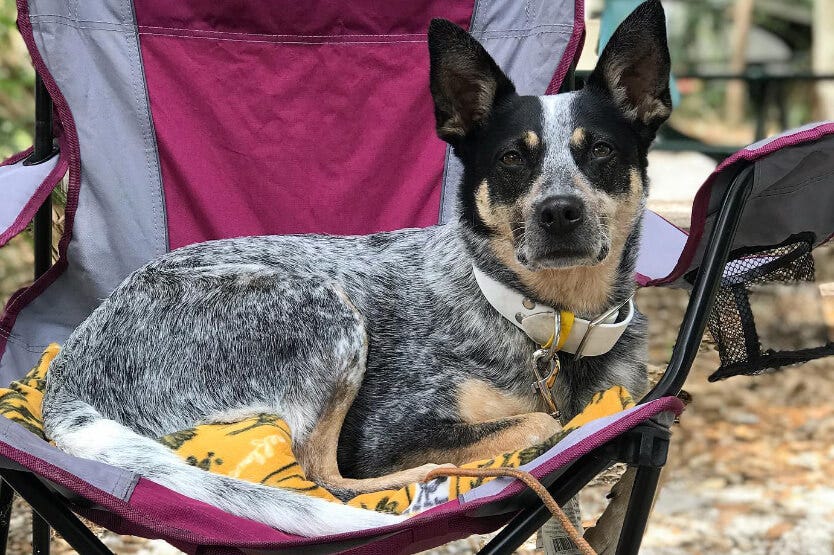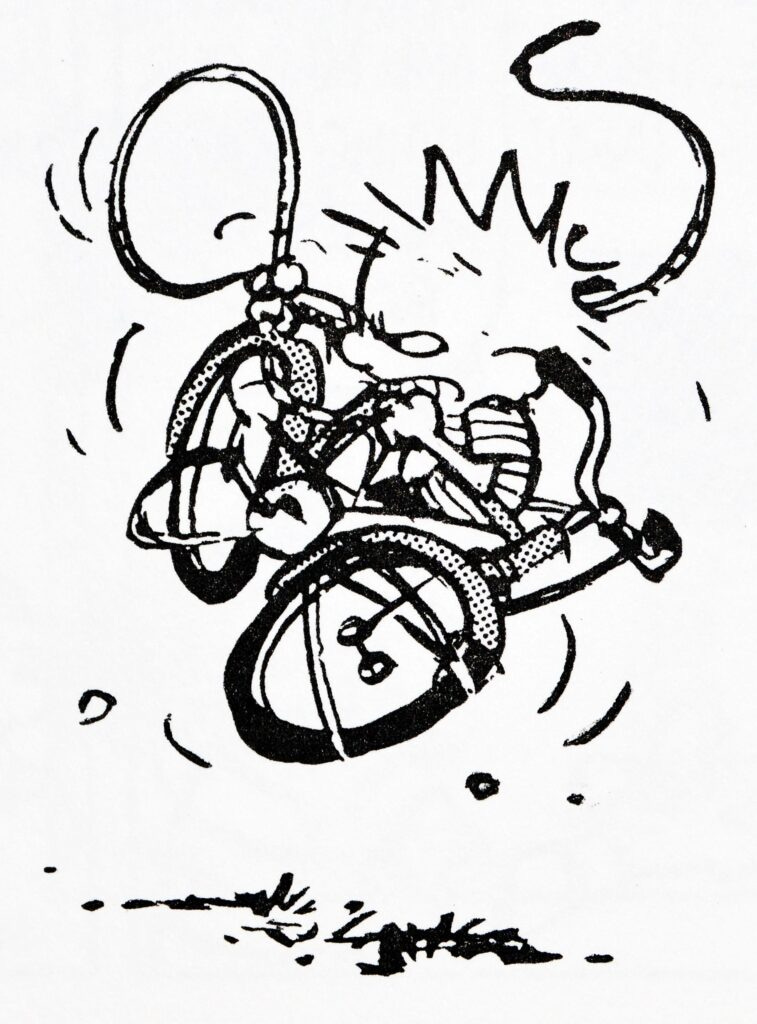Outer order inner peace? Having a (mostly) groomed dog
Guest post by Sean about Scout's maintenance needs
I think Scout is a pretty good looking dog. Most of that comes from her DNA, so props to her cells for doing it right.
But part of that also comes from the care Haley and I have compelled her to undergo. Not that we put in all that much work — I would consider her mostly groomed the same way I consider myself mostly put together. Sometimes things get smelly, but we clean up well when we have appointments to keep.
Certainly, neither of us ever find ourselves in a salon.
Dog body positivity
I hope you feel good about how your dog looks, too. It seems like everyone has some kinds of dogs they think look really good and others that they don’t like at all. Luckily, people’s tastes are diverse enough that if one person thinks a dog is ugly, another person comes along and loves the aesthetic. Even if you think you have a silly-looking dog, I bet you find their silliness endearing.
I think it’s important to feel good about the health and wellness of our dogs, just like it’s important to take care of our own health and wellness. It’s a wonderful feeling to be proud that your dog looks relatively groomed and put together.
And it also makes our dogs feel better and enjoy their lives more, so a win-win.
The top ways we take care of Scout’s physique
We have to brush the butt
When Scout’s fur builds up because she hasn’t been brushed in a while, she is a lot more antsy. She will drag her butt across the ground, spin in circles trying to grab her tail, and lick herself a lot, turning into a circus contortionist to try to reach the areas that are bothering her.
Brushing can also help keep our cattle dog cooler during the hot months (which is basically always here in Florida) — and a bonus for us, it keeps our living spaces a bit more hair free so the vacuum can stay in the closet longer.
Manicures and baths are important, too
Keeping her nails at the right length is huge for Scout’s posture and comfort when walking or running, and bathing her once in a while prevents her from scaring off the local skunks with her stench (otherwise preventing their budding friendship).
Can’t forget the exercise!
Exercise also helps both of us mammals to sleep better and feel satisfied. Just like when I go for a run and feel good from endorphins, Scout does too. They help her reduce stress and feel more calm the rest of the day.
Grooming care takes work
It’s totally cliché to say that when I’m on top of my health and feeling good about my self-care, I feel much more positive and happy in my normal daily interactions. But it’s also true — and it’s something that I forget when I start to let things slip.
I need to do a better job appreciating how good it feels to be proactive with working out or getting a haircut! It requires energy and effort to prevent procrastination or getting sidetracked and putting my care on the backburner. And that’s definitely the case with Scout’s care, too.
At the end of the day, being healthy requires doing things that are a little uncomfortable or difficult.
Sometimes my running shoes put themselves on, but sometimes I feel like I’m Calvin fighting with his bike.
It’s also incredible how much effort it can feel like to convince myself to buy a variety of vegetables at the grocery and store and look up recipes for how to actually make them taste good.
But as always, the better I practice and form things as a habit, the less work it feels like.
The difficult adult responsibilities
Little kids think that more of a good thing is always good and that the key to lasting happiness is only doing things that you like. It wasn’t our fault that we didn’t understand why we should eat our vegetables or clean our rooms, even after our parents explained it to us for the thousandth time. The idea of short-term loss or discomfort for long-term gain and satisfaction goes completely over a kid’s head.
As adults, however, we are very aware that we need to do things we don’t enjoy because it will pay off in the future.
And because we can’t explain this concept to a little kid, parents have to use a different approach that the kid can understand: a trade-off. You can’t have your dessert until you eat your vegetables. The kid agrees to do the thing they don’t want in return for the thing that they really do want.
Your adult dog isn’t a child — they’re a toddler at best
Scout is seemingly stuck in the first mindset, never understanding long-term positives at the cost of short-term negatives, except for those that are instinctual (like burying a bone and coming back to dig it up later). If she had her way, she would sleep all day, let her fur get clumpy, grow out her nails like a heavy metal rockstar, and eat her body weight in cheesy snacks.
Haley and I have to be the adults with foresight and insist that Scout does some things she doesn’t necessarily want to because it is best for her long-term health. And to be honest, putting Scout through a thorough grooming isn’t always our favorite thing either.
Easing the pain of the “must do”s
Haley does a really good job of conditioning Scout to the different activities we have to put her through. It’s really cool to see her have a positive association with the things that we both know aren’t her favorite. We used to have to pick her up to put her in the bath, but now she jumps right in and waits patiently for her allotment of peanut butter.
Unfortunately, we’re never going to be able to make everything a really fun activity. Cutting Scout’s nails is still not her favorite process, but she tolerates it well. It sucks knowing that we are putting her through a slight discomfort, especially because we can’t explain to her that it is for the best.
Just like with a kid, we offer Scout a trade-off: she gets special treats or extra social interaction and play for allowing us to take care of her.
Even so, Haley and I still put off grooming Scout sometimes. We know it is absolutely the best thing for her… but it still isn’t necessarily the world’s best and most exciting activity for any of us.
But because we are adults, we know that we need to just eat the vegetables and take the medicine.
It is a short period of discomfort for Scout that leads to a long period of being way more comfortable. In fact, I would argue that it would be cruel for us to not put her through the short-term mild discomfort.
Hard things have a good payoff
There’s actually a lot of positives from our relationship with Scout that come from regularly grooming her. Baths, cutting nails, and brushing fur all put us in unique situations with her. I get to learn about parts of her I don’t usually see.
As someone who knew nothing about dogs, I have learned a heck of a lot from these abnormal interactions.
The first time we gave Scout a bath, I saw her freeze like a statue for the first time, which helped me learn to look at her body language. I have learned so much from her body language for different scenarios/emotions that we don’t normally see. Even more importantly, these tend to be the extreme ones that I need to be ready for.
It is also a really good bonding opportunity, and it’s helped Scout learn to be okay with lots of different handling. This allows for her to be much more comfortable with physical, close-quarters interactions that can be particularly, like at the vet. If there ever is a medical problem with Scout, she will be much more comfortable with someone handling her paws, or really any sort of mild to medium discomfort.
Building trust is worth it
Overall, I think it is one of the coolest forms of trust when Scout lets me put her through a little displeasure for her long-term benefit. It’s also nice to know that I don’t have to worry that she will start to hate me if I pet her in the wrong spot



